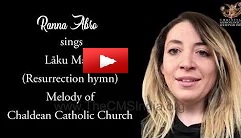
AP3 10 to 01
Qaddisa Alaha
The melody in the Chaldean Catholic Church
Sung by: Ranna Abro (USA)
The melody in the Chaldean Catholic Church
Sung by: Ranna Abro (USA)
| Call Number | AP 211 / AP3-05 |
| Part Number | Part III - The Chaldean Catholic Church |
| Title | Qaddisa Alaha. The melody in the Chaldean Catholic Church.Sung by: Ranna Abro (USA) . |
| Duration | 3:19 |
| Place of Recording | Residence of Ranna Abro, Michigan, USA. |
| Date of Recording | 27 April 2020. |
| Youtube URL | https://www.youtube.com/watch?v=tfjk36078ts |
| Video Segment (s) |
|
Notes
Ranna Abro sings Qaddisa Alaha. The melody in the Chaldean Catholic Church
The melody of Qaddisa Alaha from the Chaldean Catholic Church in Michigan, USA, in the voice of Ranna Abro.The video helps us to make comparative studies of the melody and the pronunciation of the text. Making the sign of the Cross is part of the minor doxology (1:05). The final cadence includes the addition of a neume (a group of notes sung to a single syllable) in an otherwise syllabic setting (single note to a syllable) of the text. Obviously, Ranna sings "Qaddisa, instead of Qandisa) We are grateful to Jose George Mappilaparampil for making the record happen.
Keywords: Ranna Abro, Trisagion, Qaddisa Alaha, Chaldean Catholic Church
Related Videos
- AP 2a - Fr. Charles Pyngot, C. M. I., sings 'Qandīšā alāhā'.
- AP 18e - The Sisters of St. Thomas sing the melody of Slotha for Qandīšā alāhā.
- AP 22 - The St. Jude Syro Malabar Church choir in Northern Virginia, USA, learn "Qandisa Alaaha (Trisagion in Syriac) with incipits in Malayalam.
- AP 22a - The St. Jude Syro Malabar Church choir in Northern Virginia, USA, learn "Qandisa Alaaha" (Trisagion in Syriac) with incipits in English.
- AP 25j - Rev. Fr. Sebastian Sankoorikkal: Allahu Akbar and Qandisa Hailsana, a comparison.
- AP 30 - Sunday School Children sing Qandīšā alāhā/ kandisa alaha (Trisagion)
- AP 34 - Melody of "Qandīšā alāhā" (Trisagion) in Syriac, from the solemn Qurbana of the Syro Malabar.
- AP 48c - Melody of Qandīšā alāhā Trisagion. Ammini John Anamthuruthil.
- AP 56d - Johny P. David plays Qandīšā alāhā on alto saxophone
- AP 60c - Cardinal George Alencherry sings the Trisagion, Qandīšā alāhā.
- AP 62i - Fr. Mathew Mattam sings the Trisagion, Qandīšā alāhā
- AP 62j - Slōthā (oration) after Qandīšā alāhā
- AP 64 - Qandīšā alāhā Trisagion in Syric during Qurbana in Malayalam.
- AP 66a - Qandīšā alāhā. Practice session in New Jersey for Qurbana at the Basilica of National Shrine, Washington, D. C.
- AP 70j - Qandīšā alāhā. Qurbana of the Syro Malabar Church
- AP 78d - Trisagion (Qandīšā alāhā)-Binu & Deepa singing syriac chants
- AP 80j - Qandīšā alāhā - trisagion in Syriac
- AP 82a - Qandīšā alāhā during trilingual mass in Germany. Holy Cross Church
- AP 86 - "Qandīšā alāhā," during the rite of priestly ordination of Rev Kevin Mundackal
- AP 97 - Qandīšā alāhā at Syro Malabar Church, Dallas, Texas, USA
- AP 99 - Qandīšā alāhā at St. Alphonsa Syro-Malabar Community, Southend at Sea,
- AP 119a - A different way of singing Qandīšā alāhā (pre 1962 Missal). Fr. Perumalil CMI
- AP 132b - Qandīšā alāhā during bilingual Qurbana at St. Stans, New York
- AP 142 - Qandīšā alāhā during bilingual Qurbana at Syro Malabar Convention in Houston
- AP 150 - S. Sebastian Ottaplackal: "It all started with Qandīšā alāhā"
- AP 165-9 - "Qandīšā alāhā". Trisagion. Fr. Saji Mattathil
- AP 192 - Qandīšā alāhā and Covid-19. Syro Malabar children sing in Austin, Texas
- AP 252 - An example of a "Coda" to 'Qandīšā alāhā' by Mr. Paulose Pallikkara, Alangad.
- AP 252a - A different way of singing Qandīšā alāhā. (pre 1962 Missal). Fr. Perumalil CMI.
- AP 252b - A different Coda for Qandīšā alāhā. Fr Sebastian Sankoorikal.
- AP 252c - Introducing Coda for Qandīšā alāhā for the first time in America.
- AP 252d - Yet another coda for Qandīšā alāhā. Houston, Texas.
- AP 252e - കന്ദീശാ ആലാഹാ : Qandīšā alāhā with special 'Coda'. Poulose Pallikkara. Alangad
- AP 273 - Qandīšā alāhā (Trisagion in Syriac) ; During Qurbana at St. Thomas Syro Malabar Church Connecticut, USA. : Revival of syriac to reaffirm identity - A north American story.



